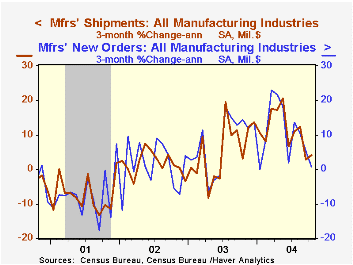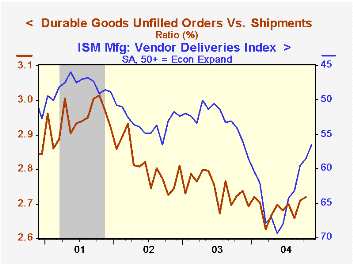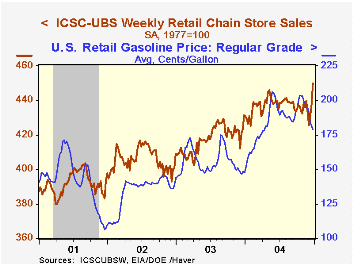 Global| Jan 04 2005
Global| Jan 04 2005US Factory Sector: New & Unfilled Orders Surged
by:Tom Moeller
|in:Economy in Brief
Summary
Factory orders surged 1.2% last month, although the advance report of a 1.6% jump in durables orders was revised down somewhat. The advance report of a 1.8% surge in nondefense capital goods orders less aircraft was revised to 0.8%. [...]

Factory orders surged 1.2% last month, although the advance report of a 1.6% jump in durables orders was revised down somewhat. The advance report of a 1.8% surge in nondefense capital goods orders less aircraft was revised to 0.8%.
Nondurable goods orders (which equal shipments) jumped 1.0% (13.9% y/y) on top of the 3.0% surge in October. Strong gains in shipments of food and paper products offset a m/m dip in shipments from petroleum refineries.
Unfilled orders jumped 1.1% suggesting that supply bottlenecks started to emerge. The ratio of unfilled orders to shipments for durables jumped to the highest level since August 2003 and supply bottlenecks also were indicated by another drop in the ISM index of vendor performance.
Factory inventory accumulation remained strong at 0.7% m/m. Accumulation in October was nearly doubled to 0.9% but the inventory to sales ratio in the factory sector rose just slightly.
"Is the Business Cycle Still an Inventory Cycle?" from the Federal Reserve Bank of St. Louis can be found here.
| Factory Survey (NAICS) | Nov | Oct | Y/Y | 2003 | 2002 | 2001 |
|---|---|---|---|---|---|---|
| Inventories | 0.7% | 0.9% | 7.2% | -1.3% | -1.8% | -6.1% |
| New Orders | 1.2% | 0.9% | 11.4% | 3.7% | -1.9% | -6.7% |
| Shipments | 0.4% | 1.6% | 11.0% | 2.6% | -2.0% | -5.4% |
| Unfilled Orders | 1.1% | 0.5% | 8.9% | 4.2% | -6.1% | -5.9% |
by Tom Moeller January 4, 2005

Chain store sales added 0.2% to the 2.7% surge during Christmas week, according to the International Council of Shopping Centers (ICSC)-UBS survey. The addition of a high sales level to the average raised the December figure 0.5% versus November.
During the last ten years there has been a 60% correlation between y/y change in chain store sales and the change in non-auto retail sales less gasoline, as published by the US Census Department.
Another decline last week in gasoline prices helped buoy consumer spending as they fell a bit more than a penny for regular unleaded to $1.77.8 per gallon (+17.7% y/y), the lowest level since March. The average price of gasoline in December fell 7.0% versus November. During the last several days the wholesale price of gasoline moved higher.
The latest Short Term Energy Outlook from the US Department of Energy is available here.
The leading indicator of chain store sales from ICSC fell 0.5% in the latest week (+0.8% y/y) but the December average rose slightly versus November.
The ICSC-UBS retail chain-store sales index is constructed using the same-store sales (stores open for one year) reported by 78 stores of seven retailers: Dayton Hudson, Federated, Kmart, May, J.C. Penney, Sears and Wal-Mart.
| ICSC-UBS (SA, 1977=100) | 01/01/05 | 12/25/04 | Y/Y | 2004 | 2003 | 2002 |
|---|---|---|---|---|---|---|
| Total Weekly Chain Store Sales | 450.8 | 449.8 | 4.6% | 4.6% | 2.9% | 3.6% |
Tom Moeller
AuthorMore in Author Profile »Prior to joining Haver Analytics in 2000, Mr. Moeller worked as the Economist at Chancellor Capital Management from 1985 to 1999. There, he developed comprehensive economic forecasts and interpreted economic data for equity and fixed income portfolio managers. Also at Chancellor, Mr. Moeller worked as an equity analyst and was responsible for researching and rating companies in the economically sensitive automobile and housing industries for investment in Chancellor’s equity portfolio. Prior to joining Chancellor, Mr. Moeller was an Economist at Citibank from 1979 to 1984. He also analyzed pricing behavior in the metals industry for the Council on Wage and Price Stability in Washington, D.C. In 1999, Mr. Moeller received the award for most accurate forecast from the Forecasters' Club of New York. From 1990 to 1992 he was President of the New York Association for Business Economists. Mr. Moeller earned an M.B.A. in Finance from Fordham University, where he graduated in 1987. He holds a Bachelor of Arts in Economics from George Washington University.
More Economy in Brief
 Global| Feb 05 2026
Global| Feb 05 2026Charts of the Week: Balanced Policy, Resilient Data and AI Narratives
by:Andrew Cates






